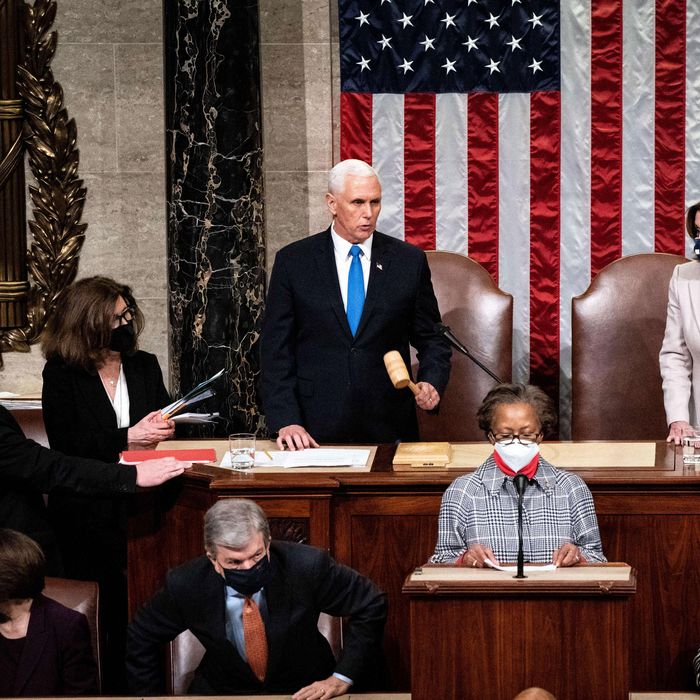
In the wake of the wall of obstruction Senate Republicans have put up against any form of voting-rights legislation, fans of small-d democracy are casting about for alternative ways to deal with threats to the franchise and fair elections. The Biden administration is pursuing executive-branch enforcement strategies to head off state-level voter suppression. But at the same time, it is occurring to many observers that the near disaster of an illegitimately contested 2020 presidential election produced a separate set of problems in the tabulation of votes and the adjudication of disputes.
The attempted insurrection on January 6 of this year was ultimately attributable to Donald Trump’s lies about the outcome of the presidential election, which in turn were enabled by a confusing and decentralized system for counting and reporting votes. But there was a reason the insurrectionists convened at this particular time and place: They sought to exploit an arcane and convoluted procedure for final confirmation of presidential elections established by the Electoral Count Act of 1887.
For the first 133 years that this much-maligned law was in place, the ritual counting of Electoral College votes in a joint session of Congress was a routine chore rarely noticed by much of anyone, and at most the occasion for scattered airing of election grievances. But the little-used provisions for challenging electoral vote awards (originally designed to deal with uncertified results or results certified by multiple state authorities) were exploited by Team Trump to make it look as though Biden’s win was tainted, while also giving the mob Trump personally incited an object for its violent assault on the Capitol.
Dangerous as the Capitol riot undoubtedly was, the moment that posed the biggest threat to our democracy occurred hours earlier, as I noted back in April:
Before the MAGA multitudes assembled, however, Trump tried to convince Vice-President Mike Pence — who, under the 12th Amendment, would preside over the joint session of Congress that would end their campaign once and for all — that he could “announce” Trump electors for states carried by Biden. Anyone familiar with the background of the ECA knew that one of the main preoccupations of the drafters was to make the vice-president’s role in the process as mechanical as possible. And the only available example of a veep exercising discretion over disputed electoral votes was Richard Nixon’s decision in 1961 to acknowledge the second of two certifications by the same governor of Hawaii (Nixon was certifying his own defeat). This precedent did not give Mike Pence the power to recognize non-state-certified electors, and to his credit he rejected Trump’s pressure to execute a coup (although, under the ECA, both Houses of Congress would have probably overruled him anyway).
Although the attempted coup failed, things might go differently in a future election — like maybe the next one. Jonathan V. Last recently argued that Trump and his minions may already be planning a better organized 2024 coup utilizing the same arcane procedures to flip the election results or throw it all into the House where Republicans control a majority of the state delegations who would elect the president if there is no confirmed Electoral College majority:
It is likely Republicans will have majorities in the congressional delegations of at least 26 states for the foreseeable future. They have a >50 percent chance of winning the House in 2022 and a pretty good shot at flipping the Senate.
So the first two preconditions for winning the presidency while losing the election are very much on the table.
Which leaves just one project: Mustering the political will to move past both the popular vote and the Electoral College.
It would be relatively easy to fix the ECA to raise the thresholds for challenging electoral votes; to make it clear the vice-president’s role in the process is purely clerical; and perhaps to sharply limit the circumstances under which state-certified results are challengeable in the first place. As election-law maven Rick Hasen argued in an interview this week, while urging reform of the ECA (among other things), protecting voting rights isn’t terribly effective unless “election subversion” is also addressed by enforceable national laws.
Could an ECA repair succeed in a Congress where voting-rights legislation has failed? Quite possibly so. It would certainly pass the House on a party-line majority vote. And there were certainly enough Republican senators who publicly objected to the attempted coup of January 6 (beginning with the seven who actually voted to convict Donald Trump on impeachment charges for his conduct on that day) to give a cloture motion a good chance of success.
And as Greg Sargent has pointed out, opposing an ECA fix would represent a serious messaging problem for Republicans:
Republicans swear up and down that their escalating voter suppression efforts are really just about restoring “election integrity” via cracking down on (nonexistent) voter fraud, to reinforce voter “confidence” in election results. If so, supporting revisions to the ECA should fit the bill perfectly.
After all, this would not represent federal encroachment on how states run elections (a frequent objection to federal efforts against voter suppression and partisan gerrymanders), but rather clarification of already existing processes. And it would reinforce election integrity and voter confidence by making it less likely that electors are counted in defiance of a state’s popular vote.
One hundred thirty-three years is long enough to leave a flawed and potentially explosive election law on the books. After what happened on January 6 it would be disgraceful to leave this 1887 law on the book unreformed when the anniversary of the insurrection rolls around. Congress should move quickly on this front before it is truly too late.
"Stop" - Google News
June 26, 2021 at 11:00PM
https://ift.tt/3vZwm0I
Congress Must Act Now to Stop the Next Election Coup - New York Magazine
"Stop" - Google News
https://ift.tt/2KQiYae
https://ift.tt/2WhNuz0
Bagikan Berita Ini














0 Response to "Congress Must Act Now to Stop the Next Election Coup - New York Magazine"
Post a Comment